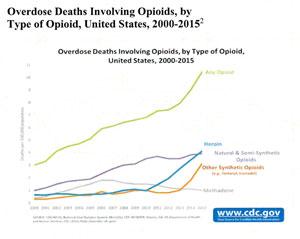 Opioid Addiction: a legal criminal justice problem or a mental health problem? For years, we have treated drug addiction in this country as a criminal justice problem. We’ve declared war on drugs and lost miserably. Our courts are overloaded with otherwise law-abiding citizens who are imprisoned for time ordinarily reserved for violent offenders who are addicted to heroin, crack or cocaine. Previous laws have taken drugs away from prescribing doctors and placed them in the hands of high risk/high reward street dealers and drug cartels who’ve used violence, intimidation, children and sex to induce innocent men and women to try their goods.
Opioid Addiction: a legal criminal justice problem or a mental health problem? For years, we have treated drug addiction in this country as a criminal justice problem. We’ve declared war on drugs and lost miserably. Our courts are overloaded with otherwise law-abiding citizens who are imprisoned for time ordinarily reserved for violent offenders who are addicted to heroin, crack or cocaine. Previous laws have taken drugs away from prescribing doctors and placed them in the hands of high risk/high reward street dealers and drug cartels who’ve used violence, intimidation, children and sex to induce innocent men and women to try their goods.
According to mental health professionals, one in 12 people who try alcohol become alcoholics; one in six who try cocaine become addicted; one in four who try crack cocaine become addicted; and one in three who try opioids become addicted.
Today, we face another drug/alcohol crisis, which in many respects exceeds all other addiction issues because these addicts are our neighbors, friends, colleagues and most cruel of all, our grandparents. Yes, most of those now dependent on opioids are our elderly. When they wore out joints and suffered injuries that created chronic pain, their doctor compassionately prescribed opioids. Unfortunately, with opioids comes narcotic creep, leading to increased dosages needed to obtain the same relief. Addiction follows.
Now, we are faced with an addiction crisis with pills so available that street dealers can obtain them from almost anyone who was over-prescribed this medicine, such as nurses, PAs and patients. The White House commission on opioid addiction has requested that President Trump declare opioid abuse a national emergency.
When the prescription drugs dry up, which they will, our neighbors will fight withdrawal. Many will head to the streets, and when they do, they will take heroin, crack cocaine and methadone, placing their lives in danger. Do we imprison our neighbors for addiction, or do we help them?
Resources are scarce. We have one treatment bed for every 20 people addicted. Mayors are reduced to applying for competitive grants that only touch the problem, while the Veterans Affairs is cutting drug treatment by 40 percent.
Our state legislature is complacent in raising grant monies for the problem and refuses to invest in its citizens who need help the most. While we have a rainy-day fund of $1.8 billion, we give none of it to this crisis, which is a national emergency. Not one dime to halfway houses, treatment, law enforcement, emergency rooms or education.
Statistics show we are about to cut off millions of dependent souls who will begin withdrawal, which causes tremors, uncontrolled sweating, feelings of anxiety, nausea, vomiting and cravings. Life savings will be lost and families destroyed. People will continue to die unnecessarily. Emergency rooms will be flooded.
The $10 million cut out of Attorney General Josh Stein’s budget demonstrates that our state legislature remains ignorant of this problem. Stein has attempted to get the state to recognize the crisis it will face when prescriptions are cut off this fall. North Carolina has four cities in the top 20 in addiction in the nation: Fayetteville; Wilmington; Jacksonville; and Hickory. Many of these addicts are veterans.
For once, let’s try not to jail our way out of a crisis. Let’s also not stick our heads in the sand. Let’s face this crisis, which calls for all of us to use our resources, intelligence and compassion, and for once, do a service to our communities, state and nation. The law, justice and mercy demand nothing less.

 How to resolve AdBlock issue?
How to resolve AdBlock issue? 








